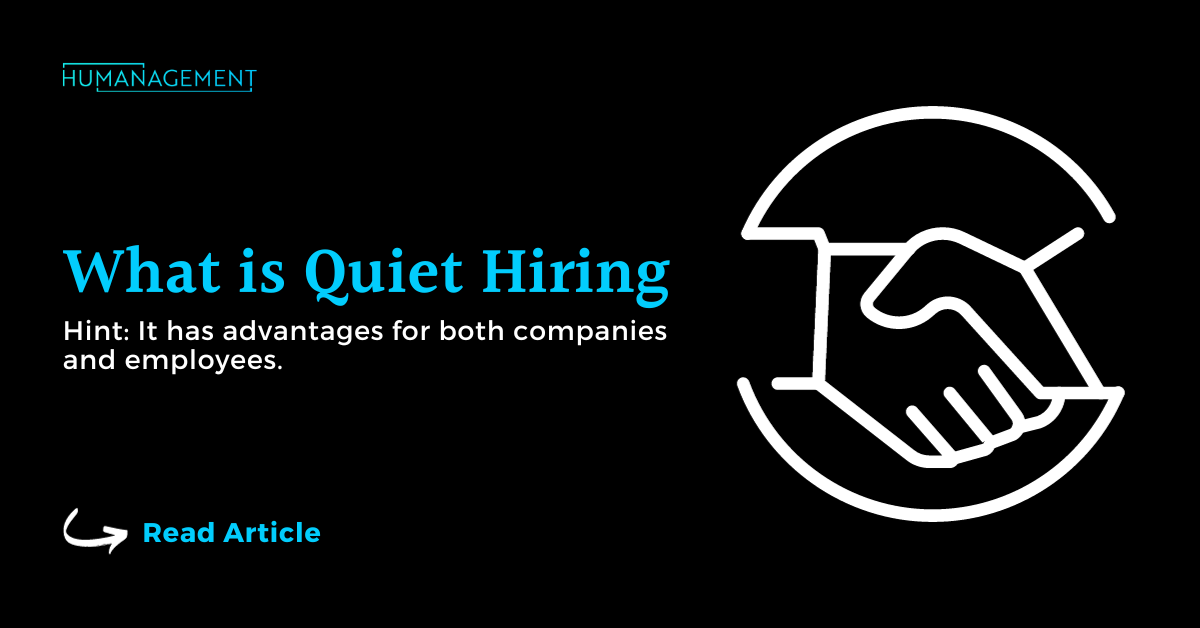

Several HR buzzwords, such as “quiet firing, “quiet quitting, and “fast quitting, gained popularity in 2022. However, in the beginning of 2023, a new word with a similar meaning—”quiet hiring”—came to the limelight. In the article, we’ll take a look at “quiet hiring” and its positive impact on your business.
“Quite hiring,” the latest trend in recruitment strategy, is when an organization acquires new talents without hiring any full-time staff. This process can be done in two ways: internally and externally. External quiet hiring is said to have taken place when companies avoid employing new talents by contracting short-term contractors to execute certain tasks.
Internal quiet hiring occurs when companies hire talents within their existing workforce when a new job role requiring new sets of skills becomes available within the company. Employers are now beginning to first analyze the employees already within their company rather than spend valuable time and resources advertising a vacancy, sorting through countless CVs, interviewing all the candidates, and eventually hiring someone. Businesses are now trying to find out if there are employees who want to advance in their career but in a different role or employees who desire to learn a new skill in a completely different role.
The fact that quiet hiring can help companies save money on job board fees, marketing expenditures, and other recruitment costs by not posting job openings is one of its biggest advantages. This strategy is especially beneficial for small enterprises with limited resources. Other costs include training expenses and the time required to conduct interviews, either by the employer or the team leaders.
In addition, by avoiding hiring another full-time employee, you save money on paying another full wage, which is probably the greatest expense associated with adding a new employee. Also, you will save money on any perks you provide to your current employees, such as bonuses.
It can just take too long to locate a new employee if you discover that your business urgently needs someone with a fresh set of talents. If you don’t have the necessary abilities in the interim, harm may have already been done by the time you’ve located someone. Also, you can be compelled to make a snap judgment and wind up choosing the unsuitable candidate, which creates even more problems.
Quiet hiring frequently leads to a quicker recruiting process since it depends on employee recommendations and direct outreach. Businesses may concentrate on a smaller pool of potential applicants rather than spending the time and resources necessary to go through hundreds of resumes and applications.
You can profit from improved staff retention if your employees are aware of the possibilities of job advancement or the ability to transition into a different role in the future at your company. This culture of opportunity will appeal to workers who dislike the concept of having a job that never changes. In turn, this may boost employee morale, engagement, and productivity since they are likely working harder to position themselves for advancement when the opportunity presents itself.
With quiet hiring, employee satisfaction is somewhat guaranteed since the employee is familiar with the company culture. Even more so, companies will benefit even more since the employee fits well and is familiar with the work ethics.
The fact that you are already familiar with the skills, personality, and work attitude of an employee makes quiet hiring one of the best processes for hiring quality candidates. Employee data such as appraisals, performance reviews, and manager reports are among the many ways to make your decision a whole lot easier. Those data will not be available if you have to employ an unfamiliar candidate.
The key to reaping all the many benefits of quiet hiring is to maintain an adequate balance between assigning tasks to workers just because you feel they can do them, which may make them feel overworked and underappreciated. Instead, ensure that workers who you feel are right for the role have the chance to apply if they want to.
Spending time to properly integrate your staff into their new roles will ensure that they fully comprehend the new obligations that have been assigned to them. Also, maintaining contact and assistance with them while they adjust to their new job can help to prevent confusion and productivity declines. After all, it will take far less time to ensure your quiet hiring is effective than it would to acquire a whole new staff.
Overall, quiet hiring will save you a huge amount of time, money, and resources by eliminating the need for a drawn-out and challenging interview process. If you look internally at your talent pool, you might be able to identify someone who is just right for any new position or set of talents your business needs, resulting in increased employee productivity and engagement in a favorable workplace.

